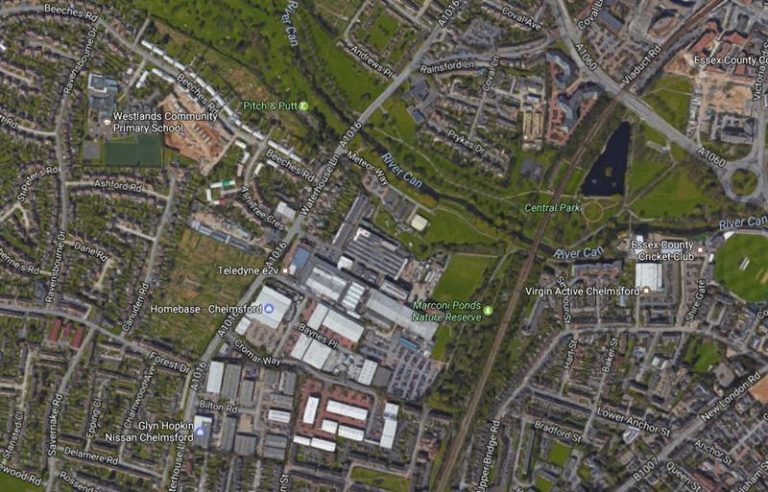Chelmsford might be rapidly developing as an increasingly popular place to work, rest and play, but at heart, it remains close to its pioneering industrial roots. From lifelong residents to passing visitors, nobody can enter the town by car without passing a sign that reminds them that this is the “birthplace of radio,” and the spirit of Guglielmo Marconi remains strong throughout the city.
It should come as no surprise, then, that industry still plays a vitally important role in the fabric of modern-day Chelmsford. Here we take a look at the overall picture of Chelmsford’s business community, and we consider the electrical demands of commercial properties in Chelmsford.
Business Parks In Chelmsford
The traditional business area was, for many years, centred around the Widford Industrial Estate to the south-west of Chelmsford. This area is still home to a number of businesses of various sizes, from relatively small, bespoke local companies to major showrooms for luxury-brand motor cars. The old Widford estate dates back more than 50 years, although it has now spread north and almost links up with the Waterhouse Lane industrial area, directly to the west of Chelmsford.
In the early 1980s, Dukes Park Industrial Estate sprang up alongside the newly formed Chelmer Village, to the east of the city. This business park initially catered more to the logistics and tech sector, with companies such as County Supplies and Chelmsford’s first computer centre setting up home there. Today, the park is predominantly home to storage depots, a car hire firm and several windscreen companies.
Perhaps it is unsurprising that Dukes Park has lost its shine, with the development of two new business parks over the past quarter of a century. Rivermead Industrial Estate rose to prominence with the redevelopment of Anglia Ruskin University‘s Rivermead Campus. It stands close to the former Marconi site for which the town is so famous, just to the north of the city centre.
However, it is the state-of-the-art Chelmsford Business Park that is seen as the jewel in Chelmsford’s commercial crown and is driving the city to even greater success and prominence by attracting new businesses and investment. Located to the northeast of the city, and close to the interchange with the A12 trunk road, it is less than a mile from Dukes Park but could not be more different.
Electrical Power Requirements
In so many things, Chelmsford is a city of contrasts. Its residents, homes, shops and pubs all come in every shape, size and type, and clearly, its business parks are no different. From down-at-heel areas where small businesses scrape a living to one of the most prestigious new developments in the country that attracts multinational giants, Chelmsford has it all.
So we can see that assessing the electrical demands of commercial properties in Chelmsford is no simple challenge.
At the most basic level, overall demand is influenced by exactly the same factors that come into play for a domestic property. These are the size of the premises and number of occupants, the age and electrical efficiency of the building and the activities and attitudes of those within it.
However, when it comes to running a company, there is far more variability around all of these factors, and then some additional considerations too. Let’s take a look at each of them in turn.
Size and Scale
It makes sense that the larger your premises and the more people that are in it, the more power you will be using. After all, a 2000 square foot office space with 100 people means lights, heating / AC and probably 100 computers, with the associated servers, printers and so on. This will clearly have greater electricity demands that a small business running out of a single industrial unit with one small office and three employees.
Business Activities
A much larger factor, however, in the electrical demands of commercial properties in Chelmsford is the business activities being undertaken. The smallest businesses, with a single phase supply, will use no more than some households and might spend less than £2,000 per year on their electricity.
However, large-scale industrial companies that operate heavy machinery alongside a significant administrative infrastructure can easily spend that much in a single week.
Building Age and Efficiency
While not such a major factor as the overall size and scope of activities, the property itself also has a significant influence on the electrical demands of commercial properties in Chelmsford. The new properties in Chelmsford Business Park are built very much with the prospective tenant’s carbon footprint in mind. They use the most energy efficient building materials to ensure the best use of natural sunlight and come equipped with energy-saving features, such as modern, efficient lighting and climate control systems.
A 50-year-old industrial unit on the Widford Industrial Estate cannot hope to compare when it comes to energy efficiency.

External Factors
The electrical demands of commercial properties in Chelmsford also depend on a number of external factors, but that is not to say that the business owner is powerless to influence them.
Today, the power supply is all about choice, and there are a huge number of suppliers in the market, each with its own rates, tariffs and conditions. Business owners need to keep a constant finger on the pulse to compare what is available and evaluate both the standing charge and the rate itself.
Physical location can also be a determining factor in the rates charged by electrical companies. Taxes, business rates and overall consumption will all influence the final cost of electricity in a given location.
Finally, it is worth bearing in mind that whichever business park a company calls home, the electrical demands of commercial properties in Chelmsford will inevitably see seasonal variations.
The rules of supply and demand apply to the electricity sector as with everyone else, and both commercial and residential prices will be higher in winter when lighting and heating are needed for longer and electricity demand is at its highest.






